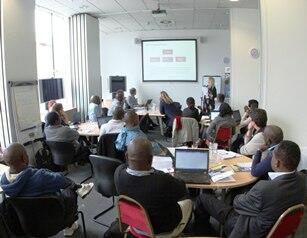
In human resources, the consortium aims to understand how decisions made, or not made, in the post conflict period can affect the longer term patterns of attraction, retention, and distribution and performance of health workers, and thus ultimately the performance of the health sector. In health financing, the programme will build knowledge about the implications for women, girls and boys in the poorest households of alternative ways of re-establishing financial support for the public system including new aid institutions, new budgeting strategies and targeted funding for priority programmes.
During the week-long workshop, the 35 participants shared their fieldwork experiences, developed skills in qualitative and quantitative research methods, and began planning for publications and dissemination activities for the remainder of the project. There was even time for partners to participate in an interactive social media session, Tweeting and writing blogs about different aspects of their research.
The project is in its second year of implementation and researchers from each country presented early findings. For example, in Uganda, whilst the post conflict phase is associated with the reconstruction of health facilities, new partnerships in health service provision and free health care, the people considered costs of health care to be higher than during the conflict because of reduced livelihoods and limited opportunities.
Researchers have also been sharing the challenges of collecting historical data from periods of conflict and early recovery, which has proven to be tough in some cases.
Reflecting on the workshop LSTM’s Senior Lecturer Tim Martineau, who is Co-Research Director for the consortium and leads the LSTM team, said:
“After all the hard work of getting the studies set up and field work underway in the past couple of years, there was a real excitement in sharing and comparing early results. We are getting some amazing insights into how health systems were in the periods of conflict/crisis and how they have evolved since then. And this is stimulating real creativity in the developing new research ideas for the next phase of the project.”